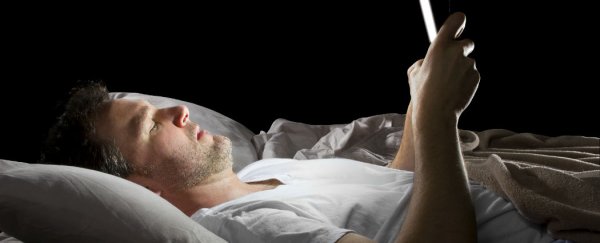Bad news for those who have replaced books with e-readers - new research suggests that if you use light-emitting e-books before bed, it could be having a negative effect on your sleep, which in turn could cause some pretty serious health issues down the line.
This year in America, 28 percent of adults have read at least one e-book, up from 23 percent at the end of 2012, and they currently make up about 2 percent of the total book market. According to The Australian, they now represent at least 12 percent of the Australian book market, and in Britain, the proportion of e-book sales is around 16 percent. It's pretty clear that they're becoming a regular part of many people's lives, so it's more important than ever to figure out if the switch from paperback to digital is causing any adverse health effects that we should be aware of
As reading is most often done in bed right before we doze off, researchers at Harvard University and Penn State University in the US conducted a small study to test the effects of light-emitting e-books on sleep. They split a group of 12 physically healthy young adults into two groups - one would read a light-emitting e-book on an iPad set to maximum brightness in a dimly lit room for four hours every night before bed over the course of five days, and the other would do the same, but with a printed book. After the five days, the two groups would swap.
Throughout the experiment, the participants' melatonin levels were measured, and their brain activity was monitored to figure out how long it took each of them to all asleep, and how long each stage of sleep lasted throughout the night.
Melatonin is a brain chemical that's emitted when we spend time in a dark environment, so when we expose ourselves to bright light, we're actively suppressing our melatonin levels. Which is pretty dangerous, as melatonin controls our daily night-day cycle, and this regulates several crucial biological processes, including how we sleep. That's why melatonin is often used as a treatment for those with problems getting to sleep.
As Nicholas Bakalar reports for The New York Times, the researchers found that exposure to the bright light of e-readers dramatically suppressed the release of melatonin in their 12 participants. It also decreased sleepiness, and reduced the time spend in REM sleep - commonly referred to as dream sleep.
"We found the body's natural circadian rhythms were interrupted by the short-wavelength enriched light, otherwise known as blue light, from these electronic devices," said lead author and neuroscientist at Penn State, Anne-Marie Chang, in a press release. "Participants reading an [light-emitting] LE-eBook took longer to fall asleep and had reduced evening sleepiness, reduced melatonin secretion, later timing of their circadian clock and reduced next-morning alertness than when reading a printed book."
The results were published in the Proceedings of the National Academy of Sciences.
Although iPads were used in the study, the team also measured similar devices that emit blue light, such as eReaders, laptops, smartphones and LED monitors. But, as George Dvorsky points out at io9, they didn't actually test these other devices with their volunteers, so we can't draw any conclusions related to these devices just yet. And as the iPads used in the experiment were cranked up to full brightness, perhaps by simply turning the brightness down, we could effectively lessen the negative effects.
On the other hand, four hours of screen exposure before bed is an unrealistically modest amount of time, if we're thinking about actual people's lives, as Dvorsky explains:
"The four-hours of exposure to LE eReaders prior to sleep is not indicative of reality these days. Most of us experience far more than that - typically around seven to eight hours. In future, I'd like to see the study repeated, but with real world conditions, an assortment of devices (the effects of each measured individually), and at varying rates of illumination. Also, melatonin rates should be measured after the end of each night rather than at the end of the five-day session."
It's still early days, but preliminary results suggest that we need to seriously reconsider our commitment to screens in the hours preceding bedtime if we want to ensure our ongoing health.
"Much more has to be known about the kind of impact these devices have on our health and well-being," Chang told Bakalar at The New York Times. "The technology moves quickly, and the science lags."
Sources: The New York Times, io9, Harvard University
